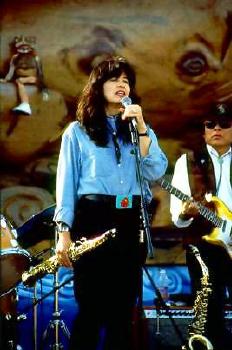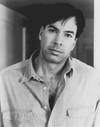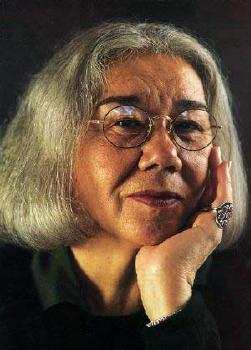|
|
|
|
Famous Indian Authors Visit Schools
by Rhina Guidos Reno Gazette-Journal
Photos (top to bottom) Joy Harjo, Greg Sarris, Elizabeth Cook-Lynn
 Members of northern
Nevada's American Indian tribes got a treat this week as national writers belonging to different American Indian
tribes discussed their experiences and insights as authors, while in town for the fourth annual Great Basin Book
Festival. Members of northern
Nevada's American Indian tribes got a treat this week as national writers belonging to different American Indian
tribes discussed their experiences and insights as authors, while in town for the fourth annual Great Basin Book
Festival.With a grant from the John Ben Snow Trust, Joy Harjo, Elizabeth Cook-Lynn and Greg Sarris, a trio of prominent American Indian writers visited the Stewart Indian School in Carson City, the Pyramid Lake Paiute Tribe Middle and High School and McKinley Arts and Cultural Center for a Friday afternoon lecture. Karen Shaw and Florence Nez, of the Pyramid Lake Paiute Tribe, sat on the steps of McKinley School Park Friday afternoon when they recognized one of their favorite writers. They quietly sidled up to Harjo, a member of the Muscogee Creek tribe of Georgia, and author of several books. “I admire them,” Nez said. "They're Indian and now they're renowned speakers. It makes you proud.” Harjo, Cook-Lynn, of the Crow Creek Sioux tribe and Sarris discussed the complexities and sometimes difficult moments of being thrown into a American Indian literary genre and being an Indian author.  "There's no one voice,” Harjo said. “I don't represent the voice of the Muskogee nation but I
am a voice.” "There's no one voice,” Harjo said. “I don't represent the voice of the Muskogee nation but I
am a voice.”“Not one person represents the culture,” Cook-Lynn added. In her travels, Harjo said sometimes people are disappointed when they go to see a American Indian author and they find her dressed in everyday clothes. “They want to see me dress a certain way,” Harjo said. “They want me in powwow outfit.”  Shaw, a University of Nevada, Reno student and member of the Pyramid Lake Paiute tribe, said she found
the lecture helpful and found a lot that she could use with her future students. Shaw, a University of Nevada, Reno student and member of the Pyramid Lake Paiute tribe, said she found
the lecture helpful and found a lot that she could use with her future students."They're able to tap into an Indian perspective,” Shaw said. “Even though they don't represent all of us, they have a certain viewpoint and perspective that's helpful.” Children and adults from the Reno-Sparks Indian colony and from Washiw Wagayay Mangal school in Dresslerville attended the lecture to greet the authors. “You want to find a way to make children identify themselves with them,” Shaw said. “Because even though we are from different cultures and different tribes, there are some things that we share in common.” |
|
Joy Harjo Elizabeth Cook-Lynn Greg Sarris |
|
|
| Canku Ota is a free Newsletter celebrating Native America, its traditions and accomplishments . We do not provide subscriber or visitor names to anyone. Some articles presented in Canku Ota may contain copyright material. We have received appropriate permissions for republishing any articles. Material appearing here is distributed without profit or monetary gain to those who have expressed an interest. This is in accordance with Title 17 U.S.C. section 107. |
|
Canku Ota is a copyright of Vicki Lockard and Paul Barry. |
|